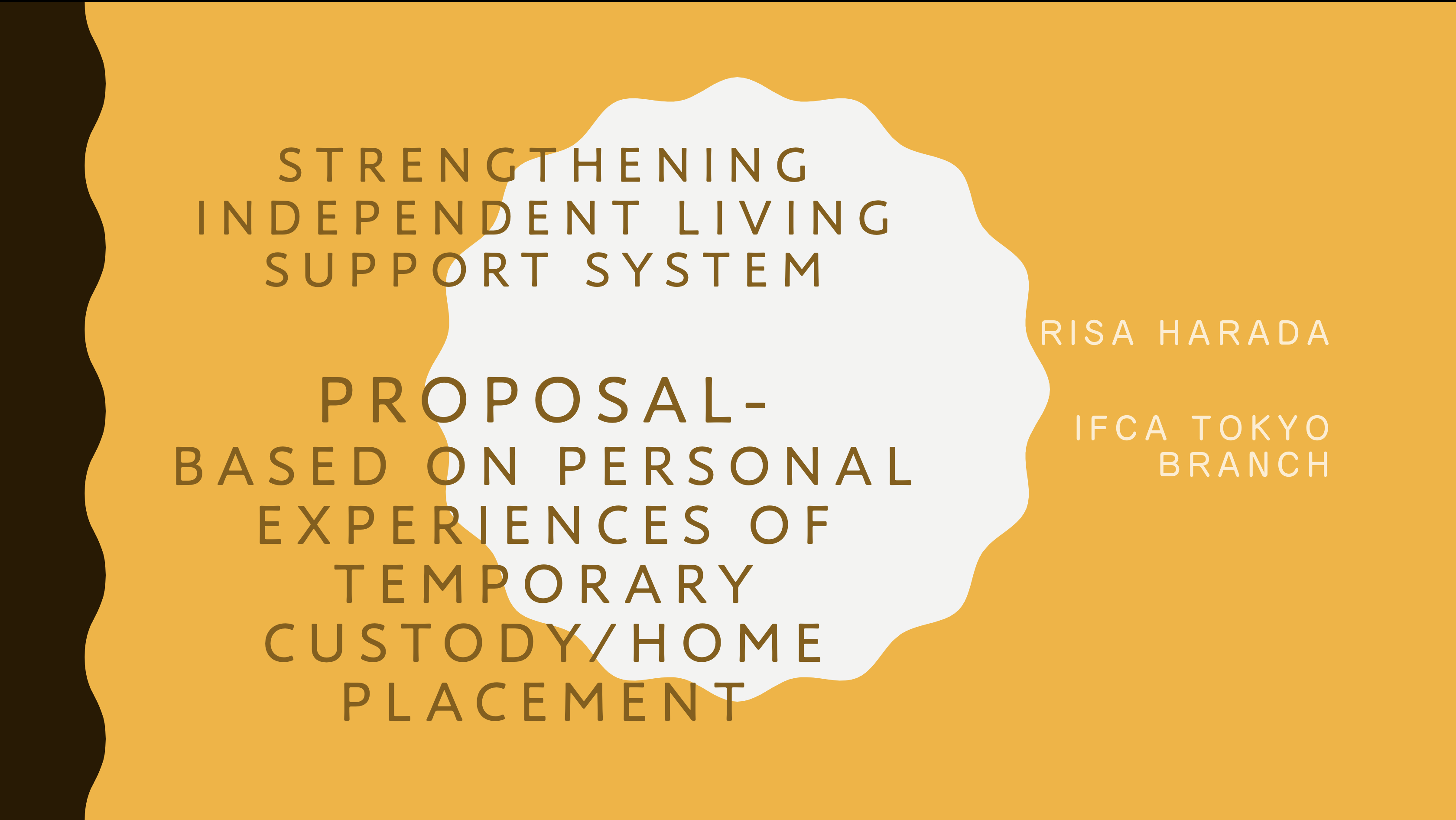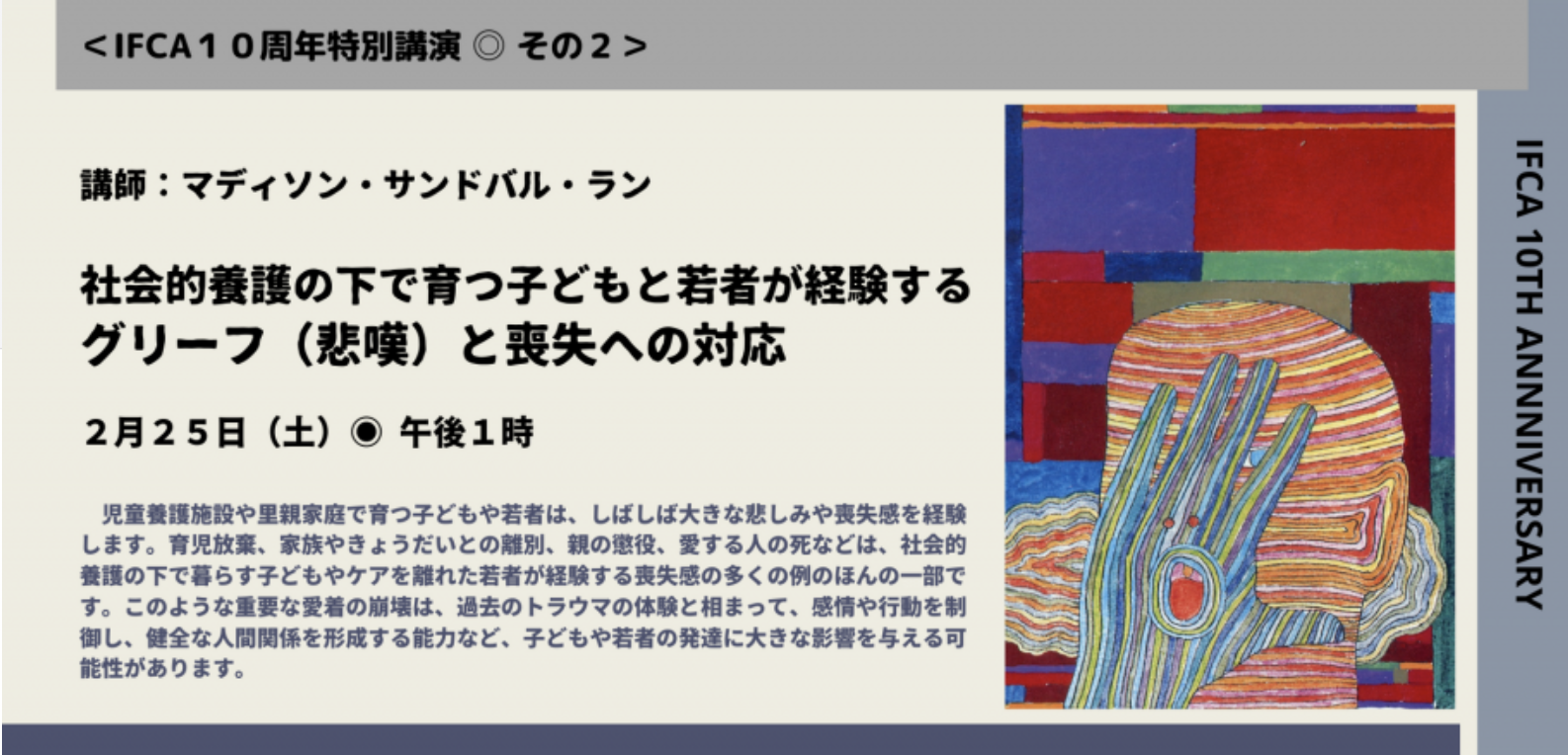Hello, this is Harada from the IFCA Tokyo team.
I’ve just participated in the “Opinion Exchange Forum on Strengthening Independent Living Support for Foster Care” held at the Ministry of Health, Labour and Welfare.
Ms. S. and I from the IFCA Tokyo team participated in the forum as foster care alumni. (The details of Ms. S’s speech will be posted soon, so don’t miss it!)
I spoke as a person who has experienced temporary custody and then home placement where I was returned to an abusive family.
Here are my actual slides from the opinion exchange session.
My hard work of preparation pays off when many of you can take a look!

By the way, when you hear the word “temporary custody”, some of you may think “temporary custody is not exactly foster care.”
Apart from this forum, there have been many times I was told something like “strictly speaking, temporary custody is not part of foster care”, by the reporter, interviewer and those who have experienced child protection facilities and institutions.
However, the truth is that the Child Welfare Law does not define what the term “foster care” means.
(Meaning- it doesn’t say that “when you use a child protection facility, it means you were under foster care,” or “temporary custody is not considered as foster care” either).
In other words, it’s not exactly the right way to put “even iif you experienced temporary custody, it doesn’t mean you have received foster care.”
Whether it was temporary custody or adoption, especially in recent years, if a child is separated from his or her parents for any reason by administrative intervention and the society takes over for the parents to protect and care for the child, it is foster care isn’t it?
If someone still believes “temporary custody is definitely not foster care”, I think that is OK as well.
So now, let’s get to the main discussion.

I began by explaining, using PPT slides, the route through which the children were placed in temporary custody. The blue areas are the route I took.
I had counseling sessions at Child Guidance Center for 48 times; however, I was never taken to temporary custody. When I became a high school student, I happened to show my bruise from abuse at the police station and was taken into temporary custody immediately on the same day. I was told, “we have to place you in an emergency protection service because this bruise cannot be done unless an male adult has an intention to kill.”
However, at the temporary protection service, there were many rules and regulations, like forbidding private conversation. It made me feel as if I was in jail, and worried. So I finally said “please let me go home,” and they did let me go back to my abusive family without any improvement, after only one week of temporary placement.
The following slides summarize the challenges of temporary custody.

I happened to be placed in an adverse temporary shelter (of course there are good temporary shelters, apparently!)
The choices I had were extreme, either “going back to an abusive family” or “staying at the jail-like temporary protection.”
It’s like choosing either “curry-flavored crap” or “poop-flavored curry.” Both are so displeasing, but this would be considered as your own decision- they tell you “that’s your decision.”
I’ve requested disclosure of my record, and these are the images.

As you can see, even though it’s my personal information, it’s all covered in black and cannot see what kind of decision was made.
I told them not to cover in black because this record belongs to the child. The original record of my case has been destroyed due to retention periods and cannot be retrieved again.
So, I have asked that the retention period must be removed as well.

This time, I was asked to talk about my independent living at the opinion exchange forum at the Ministry of Health, Labour and Welfare. However, as I was having such a difficult time after I was returned to an abusive family from temporary custody and I could not afford to think so much about independent living. Education and employment can be achieved only in a safe and secure environment. So I stated there are still many challenges before we are able to talk about independent living.

On the last slide, I talked about the disclosure request I mentioned earlier, and how important it is to include children and reflect their opinions and views to make significant decisions in the child’s life.
And I requested for an independent living support which makes sure that the child receives support from the family for his or her desired career path when returning home, or if it’s not possible to support by the family alone, then he or she should be able to get support from the family in addition to society according to the level of support needed.
Conclusion
Although we, the foster youths who participated, did not discuss prior to this forum, I was very excited to see the shared messages – that is a request for “the support that we can receive no matter how old we are!” It was very heart-warming.
One of the former youth participants, who is now in 30s, was not able to receive support at that time because the system was very weak. Now, while the systems are gradually improving, they are still unable to receive scholarships and other support for higher education due to age restrictions on support for young people. I hope that these issues will be recognized and improved one by one.
I really appreciate having the opportunity to speak at such an important forum.









コメントを残す